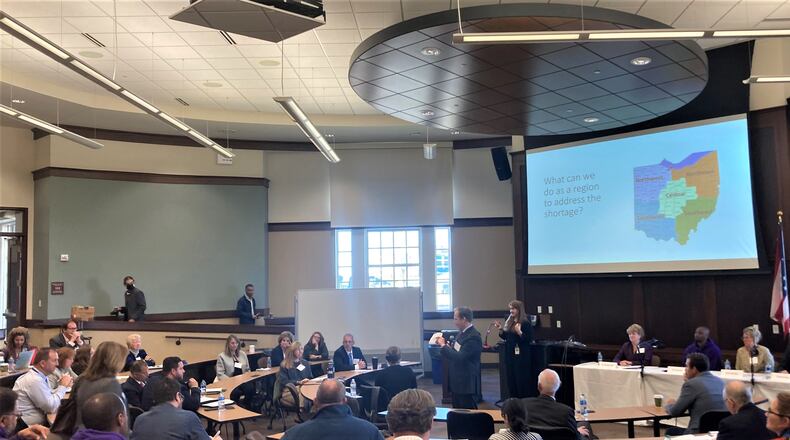It was a first-of-its-type meeting that will now be repeated at designated universities in four other Ohio regions in the coming weeks.
“Teachers are so important to our students and their communities,” said DeWine in the southwest Ohio conference’s opening. “They provide the quality education students need to succeed in school and later in life.”
“Ohio, like many other states, is facing a teacher shortage,” he said while thanking the Ohio departments of education and the state’s department of higher education for sponsoring the first-time meeting.
“Now is the time to think in innovative ways about how we can work together to assure that Ohio remains one of the best education systems in the country.”
According to a Dayton Daily News analysis of Ohio Department of Higher Education data performed in April, the percentage of people graduating from public Ohio colleges with education degrees declined from 9.63% to 6.36%.
In that span, the number of bachelor’s degrees awarded across all fields rose from 38,493 to 49,963. But the number of education degrees went in the opposite direction — from about 3,700 per year through 2014, into a year after year decline that hit 3,180 in 2018.
Adding to the teacher shortage in recent years have been more K-12 instructors, who are part of the Baby Boomer generation, reaching retirement age. The trend was compounded by a spike in retirements where departing instructors cited the onset of the COVID-19 pandemic in March 2020 the historic upheaval to schools in 2021.
Dozens of area K-12 school officials were joined by leaders from Miami University, Xavier University, Cincinnati State Technical and Community College as well as local business executives as the state attempts to weave together a joint public education and private sector cooperative in tackling the problem.
Jason Lane, Miami’s Dean of the College of Education, Health, and Society, was among the speakers and said the topic has generational urgency.
To address the teacher shortage “we really need to think collaboratively and creatively as region,” said Lane.
“We know that great communities are built on great schools and great schools are built on great teachers.”
Also among the conference panelists was Kee Edwards, assistant HR director for Middletown Schools, who spoke about that district’s many efforts improve both recruitment and retention of classroom instructors for its 6,300-students.
Edwards said the gathering and the scale of the state and local effort was historical.
“For the first time, we had higher education and K-12 education legislators and our state department of education all sitting in the same room to discuss the teacher shortage crisis. This was a significant first step because we had all the right people together, and now we can start moving to action.”
“It was a joy to talk about our teacher recruitment efforts for Middletown City Schools,” said Edwards, who cited the district’s Admiral Squad program designed to recruit more African-American males into the teaching profession.
About the Author

